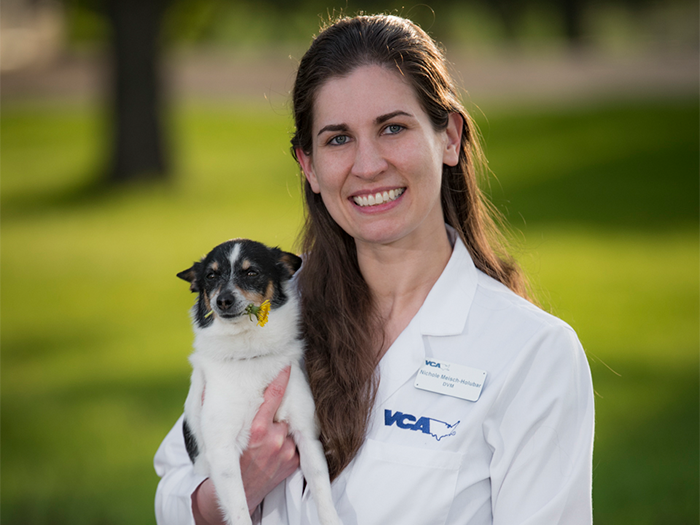
Lifelong Dream
Hesitate at first to share her story, Dr. Nichole Meisch-Holubar nonetheless agreed to an interview.
“I don’t think I’m very exciting,” she said, “although my techs seem to really enjoy working with me as I like to keep them in a good mood by keeping things a little lighthearted.”
She may have missed her calling to become a stand-up comic, but one thing is for sure, Meisch-Holubar has a long-standing dream of being a veterinarian.
“I grew up with my mom telling me I said I wanted to be a vet since I was three,” Meisch-Holubar said. “In fact, she says I was dead set on skipping kindergarten and going straight to vet school.”
Growing up on a dairy farm, she said that experience didn’t factor into her decision to become a veterinarian. It did however, have a strong influence on what type of medicine she wanted to practice.
“Growing up on a dairy farm made me decide to not do large animals,” she said. “I was tired of cows by then and the work is so rough on your body.
“I’ve always had a love for animals and I love that I can make a difference as a veterinarian.”
Today Meisch-Holubar is a staff veterinarian working at the VCA Cascade Animal Medical Center in Rochester, Minnesota. She joined that team in 2016 after spending the first six years after graduation at another VCA hospital in Wisconsin.
She works with small animals exclusively and has an affinity towards cats first, then dogs. In recent years, she has also started caring for exotics that come into her clinic.
No matter the patient, Meisch-Holubar encourages preventive care treatments.
“It’s so much better to be proactive than reactive,” she said. “I will talk about weight and dental care most often and most clients are willing to listen.
“There are definitely the clients who will tell you straight up they will do what they want.”
There are good days though. Meisch-Holubar recalls a recent case when a long-time patient, a therapy dog, presented one morning with what she later diagnosed as hemoabdomen.
“This was the first time I had a client actually OK going to surgery for this diagnosis,” she said.
After performing her first splenectomy, the dog has recovered after also being treated with oral chemotherapy.
“While the dog eventually took a turn for the worse, the owners were grateful for the extra months we gave them,” Meisch-Holubar said.
It’s helping patients like these that Meisch-Holubar dreamed about as a young girl.

